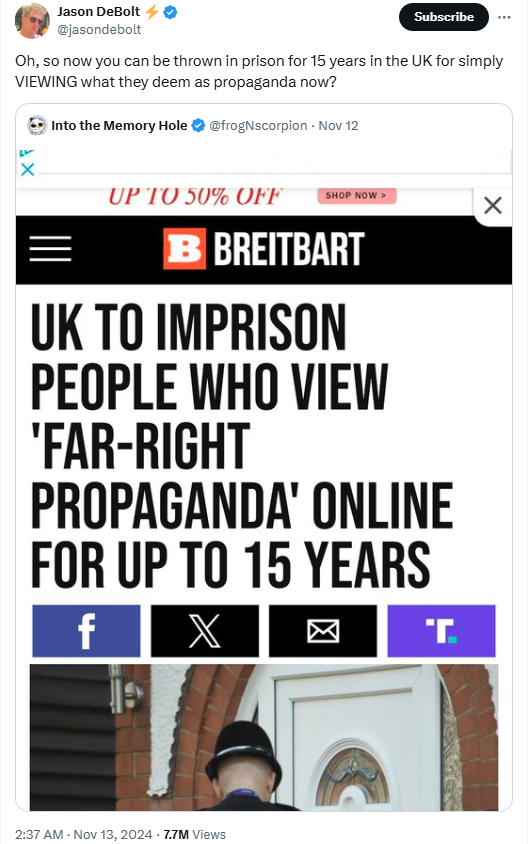
Does a new U.K. law require a 15-year prison sentence just for looking at propaganda? No, that's not true: Terrorism law experts told Lead Stories that the law is aimed at people who repeatedly look at or download terrorist content online, but only if they clearly intend to take part in or support terrorist activities. Intent is key here: Accidentally or casually looking at this content doesn't count. The law also protects researchers, journalists and others who would have a good reason to view this material for their work.
The claim appeared in a post (archived here) on X on November 13, 2024, under the on-screen title "UK TO IMPRISON PEOPLE WHO VIEW 'FAR-RIGHT PROPAGANDA' ONLINE FOR UP TO 15 YEARS." The post's caption said:
Oh, so now you can be thrown in prison for 15 years in the UK for simply VIEWING what they deem as propaganda now?
This is what the post looked like on X at the time of writing:
(Source: X screenshot taken on Tue Nov 12 16:49:09 2024 UTC)
The post didn't give any proof to back up its assertion.
For starters, the law is not new, nor is the screenshot of the 2017 Breitbart article (archived here) in the post. The Counter-Terrorism Border and Security Act 2019 was more than 5 years old at the time of writing. Passed in February 2019, it made changes to the Terrorism Act 2000 and the Terrorism Act 2006.
Legal experts
Terrorism law experts told Lead Stories that the law is not merely about someone "simply viewing" propaganda. It's more specific than that. In a November 13, 2024, email to Lead Stories, Alan Greene, a constitutional law expert at the University of Birmingham, England, Law School, said this about what constitutes an offense under the law:
It must be material useful for 'committing or preparing an act of terrorism.' As such, the legislation expressly excludes 'instigation'. So it is the kind of material which the courts have said:
'must contain information of such a nature as to raise a reasonable suspicion that it is intended to be used to assist in the preparation or commission of an act of terrorism. It must be information that calls for an explanation.' (K v R [2008] EWCA Crim 185.)
So for example, the legislation is aimed at material on how to make a bomb etc.
The definition of a violation of the law is included in Section 58 of the Terrorism Act 2000. There is no mention of propaganda.
Stuart Macdonald, a criminal law and counterterrorism expert at Swansea University in Wales, explained the law this way in a November 13, 2024, email to Lead Stories. He said:
In short, the section 58 offence criminalises the collection of information, or possession of a document, that is likely to be useful to a terrorist. For someone to be guilty, it must be shown that they knew they had collected or were in possession of the information/document, that they knew the nature of its content, and that they lacked a reasonable excuse for its collection/possession.
Jonathan Hall, the official independent reviewer of terrorism legislation in the United Kingdom, echoed Greene and Macdonald. In a November 13, 2024, email to Lead Stories, he said:
Only terrorist propaganda that encourages acts of terrorism or is material that is inherently useful to a terrorist e.g. bomb manual. ...
In 2019 section 58 Terrorism Act 2000 was amended to make it an offence to view online material inherently useful to a terrorist.
The website of the independent reviewer of terrorism legislation says it's Hall's job to "scrutinise and report on terrorism legislation." Although his role is appointed, Hall does his job with autonomy:
I carry out my role from a position of complete independence, with access to secret and sensitive national security information and personnel in order to carry out my role.
Read more
Other Lead Stories fact checks of claims concerning the United Kingdom are here.


















